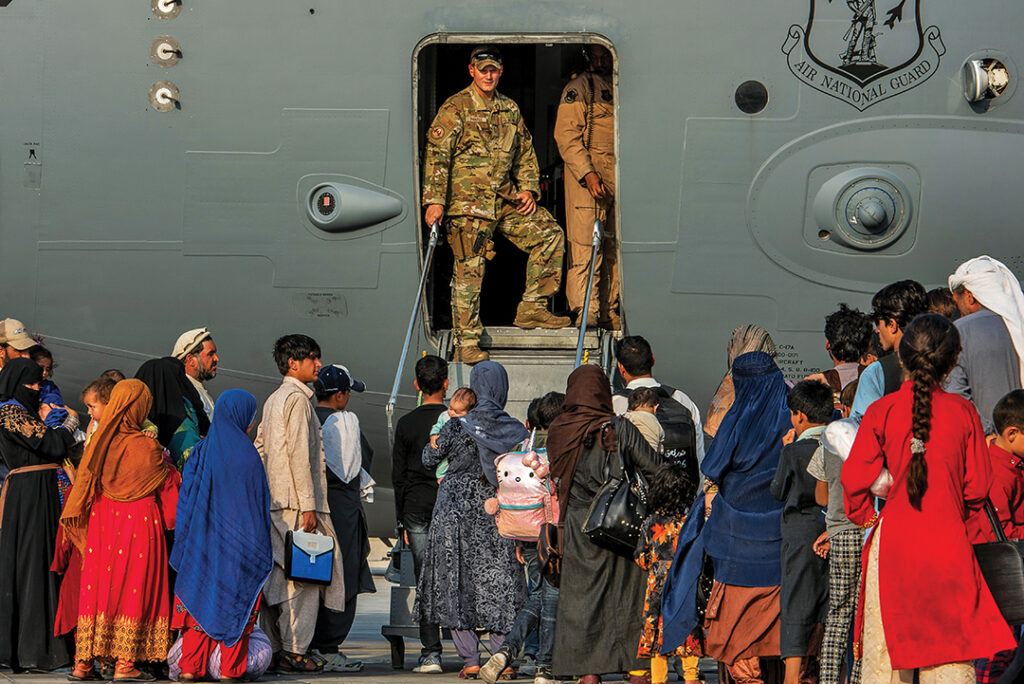UNIPATH STAFF
On the 20th anniversary of the 9/11 attacks on the United States, dozens of security experts, including several current and former commanders at U.S. Central Command (CENTCOM), attended a two-day conference contemplating the repercussions of that fateful day.
What emerged was a crucial lesson for global security: If counterterrorism coalitions that exist now had existed in the 1990s, they might have prevented the 9/11 attacks and the rise of al-Qaida. In other words, multinational partners working together in their common interests represent a force for peace.
The Near East South Asia Center for Strategic Studies hosted the Great Power Competition conference in September 2021.
U.S. Air Force Maj. Gen. Alexus Grynkewich, CENTCOM’s chief of operations, spoke about a “dense web of allies” that project power more effectively than any single nation working alone. Many of those alliances were solidified in the post-9/11 environment and played a decisive role in defeating ISIS in Iraq and Syria.
Retired U.S. Army Lt. Gen. H.R. McMaster, a former U.S. national security advisor who held several senior positions at CENTCOM, noted that partnerships of intelligence services, special operations, conventional forces and law enforcement across nations multiply the effectiveness of counterterrorism efforts.
In the 20 years since 9/11, the United States has helped build the capacity of its partners to confront violent extremists more effectively, McMaster said.
“For a relatively small amount of investment, we can work through partners to ensure that these jihadist groups don’t gain the strength and power,” he said during a presentation at the two-day conference in September 2021 in Tampa, Florida, in the U.S.
Evidence of multinational counterterrorism coalitions abound. The Bahrain-based Combined Maritime Forces consists of three task forces made up of dozens of naval powers. The coalition patrols the sea lanes around the Arabian Peninsula in anti-piracy, countersmuggling and counterterrorism operations.
Saudi Arabia’s Islamic Military Counter Terrorism Coalition and Coalition to Support Legitimacy in Yemen are attempts to suppress violent extremists and their sponsors.
The Global Coalition to Defeat ISIS has existed since 2014 and consists of more than 80 member states dedicated to eliminating the vicious terrorist movement that once occupied parts of northern Iraq.
Qatar has hosted Al Udeid Air Base, the point from which coalition air power launched missions against ISIS. The base was also central to supplying Afghans during the 20-year stabilization campaign in that country and served as an evacuation point and sanctuary for Afghans fleeing Taliban oppression.
“If we had had the coalition of partners and shared senses of purpose when it came to counterterrorism in the years running up to 9/11, I don’t know that 9/11 would have happened. I’m not sure al-Qaida would have happened,” said Gina Bennett, one of the U.S. Central Intelligence Agency’s top experts on al-Qaida and a presenter at the conference.
Security experts warned against complacency as the United States focuses more on what it calls “great power competition” with China and Russia and regional competition with Iran. Counterterrorism remains a central focus of a united global security strategy.
Retired U.S. Army Gen. David Petraeus, former commander of CENTCOM and onetime director of the U.S. Central Intelligence Agency, called for a reinvigoration of military and security partnerships using technology.
Although violent extremists employ technology such as unmanned aerial systems, or drones, to compete with more powerful armed forces, that same technology benefits the U.S. and its partners as well.
He noted that relatively economical drone systems, combined with intelligence sharing, allow U.S. partner nations to conduct much of the fight against terrorists. “Host nation forces can do that as long as we do the training and equipping, advising and assisting,” Petraeus explained.
As technology evolves, some of these weapons won’t even require remote guidance. Future breakthroughs will allow systems, once properly programmed, to fight autonomously.
“The opening stage of conflicts in the future could be contested by autonomous systems,” he said.
Retired U.S. Army Lt. Gen. Terry Wolff, director of the Near East South Asia Center for Strategic Studies, criticized the U.S. for overoptimism when engaging in complex missions such as those in Iraq and Afghanistan.
With its historical go-it-alone mentality, the U.S. has paid insufficient attention to pursuing alliances that would aid global peace. The U.S. has mistakenly treated such partnerships as an afterthought, Wolff said.
U.S. Marine Corps Gen. Kenneth McKenzie, then-commander of CENTCOM, described how it was paying greater attention to strengthening partners. He cited examples such as the Counter-ISIS Train and Equip Fund that has distributed more than $700 million in the Middle East.
“By advancing our shared interests and coming together to face shared threats, U.S. CENTCOM develops capable regional partners to act as guarantors of their own security and sovereignty, able to secure their own borders and ensure their internal stability,” the general said.
With a reemergence of hybrid styles of conflict that avoid outright battles between conventional militaries, the U.S. and its partners need to stay alert to shifting threats. Gen. McKenzie reminded conference attendees that the intelligence, military and political oversights that led to 9/11 still require the attention of powers today.
“There are no errors so old that we can afford to ignore them,” he said.

